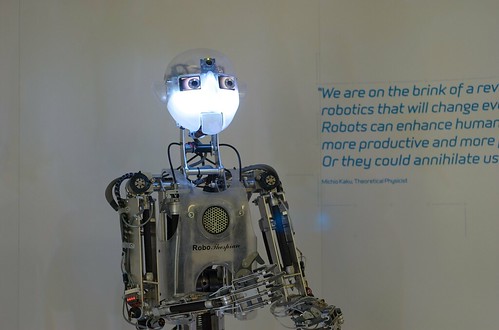Talk like me by pursyapt
My research endeavors originally started with an attempt to understand interactions between learners and virtual characters, bots, and other artificially intelligent beings. Even though a lot of that research has been published, there’s still a couple of papers arriving. As we are moving closer and closer to everything (and i mean everything) being networked, I believe that it’s important to keep on examining our mediated existence and the ways we experience and interact with emerging forms of media. This is especially true for education. Until very recently, educators and practitioners have been adopting technologies developed for non-educational purposes and using them to fit education needs (e.g., TV, Radio, computers, the Internet, YouTube, iTunes, the list is endless). This might be changing a little bit with the booming interest in educational technology, but when we adopt technologies developed for other purposes, we need to investigate the congruency between those technologies and our teaching/learning context.
In a paper that a graduate student and I wrote, we tried to understand what learners and virtual characters may discuss when they have the ability to have open-ended conversations. If you were a student, and a virtual robot (of sorts) was deployed to support your learning, what would you ask it (him?her?)? If you could talk about anything, what your interactions with him/her (it?) look like?
Here’s our abstract, describing our findings:
Researchers claim that pedagogical agents engender opportunities for social learning in digital environments. Prior literature, however, has not thoroughly examined the discourse between agents and learners. To address this gap, we analyzed a data corpus of interactions between agents and learners using open coding methods. Analysis revealed that: (1) conversations between
learners and agents included sporadic on-task interactions with limited follow-up; (2) conversations were often playful and lighthearted; (3) learners positioned agents in multiple instructional/social roles; (4) learners utilized numerous strategies for understanding agent responses; (5) learners were interested in agents’ relationship status and love interests; and (6) learners
asked personal questions to the agent but did not reciprocate to requests to talk about themselves.
You can download a pdf of the full paper below:
Veletsianos, G. & Russell, G. (2013). What do learners and pedagogical agents discuss when given opportunities for open-ended dialogue? Journal of Educational Computing Research, 48(3), 381-401.




